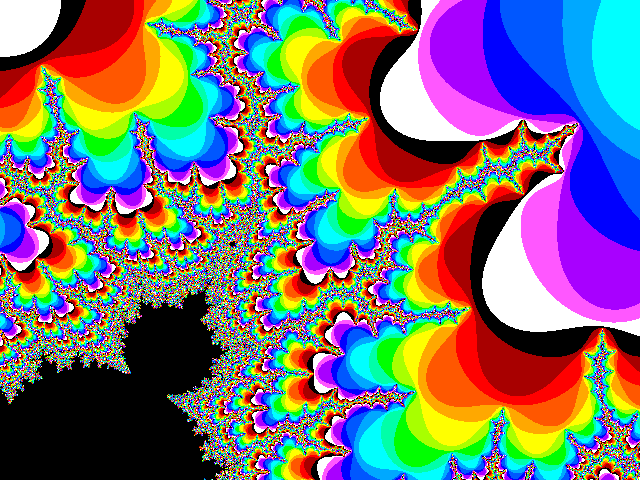It’s an open secret that the CSA mandelbrot benchmark tool (available in my ‘basic Transputer tools‘ package) is one of my favorite benchmark and test-tool when playing around with my various Transputer toys.
One fine day I thought VGA with more than 16 colo(u)rs would be nice… and the coding began. First step: Put the original source (well, already enhanced by a timer and some debugging) on github.
The original CSA Mandel program uses the official 640×480 16 color VGA mode (aka 0x12) and uses its own calls for that, i.e. no external 3rd party libs. Very manly 😉 but not very colorful…
So I created the first branch (aka Mandel_3) added a more “modern” command-line options handling and dived into hand-coding VBE (VESA BIOS Extensions) matters. That was very instructive and fun… and the first results showed that I didn’t just got 256 colors now but draw speed was increased, too 😯
Look Mom! More colors:
Running in host-mode (/t) on my P200MMX the initial screen took 6.6s vs 7.1s for 16-colors – so a difference of 0.5s or 7% should be much higher on Transputers, so I thought. And should this mean that bigger Transputer farms had been bottleneck’ed by the actual plotting of pixels?
Because 256 colors and higher resolutions (up to 1280×1024 depending on your VGA cards VESA BIOS) are fine, but even more colors are better, I branched the code a 2nd time (MANDEL_BGI) and replaced the VBE code by a BGI SVGA interface.
While originally Borland only supports VGA, there are 2 BGI drivers written by 3rd party developers which do support SVGA and up to 24-bit colors.
It’s commonly known that BGI is not the fastest graphics interface on planet earth… and the benchmark proved this:
| P200MMX | Orig | VESA | SVGA | SVGA256 |
| 1 | 7.123 | 6.623 | 8.911 | 6.915 |
| 2 | 38.258 | 36.635 | 39.717 | 37.725 |
I was hoping the change would have more impact when running the same on my Cube system… well it didn’t:
| 65x T800 (integer) | Orig | VESA | SVGA | SVGA256 |
| 1 | 2.323 | 2.288 | 3.940 | 2.383 |
| 2 | 8.163 | 8.173 | 8.181 | 8.164 |
So as final conclusion, I will stay with the VBE SVGA drivers included in the V3.x code – it’s a good compromise between overall code/distribution size, comfort and speed.
The original VGA mode (0x12) will stay in the code forever to get comparable benchmark measurements – if you really need CGA/EGA/Hercules, you can always use the 2.x version.


